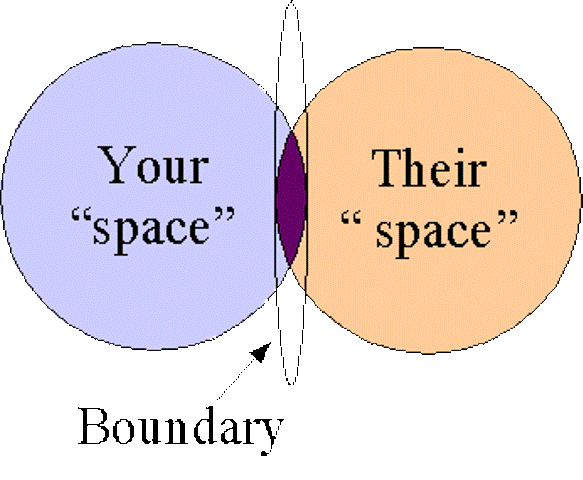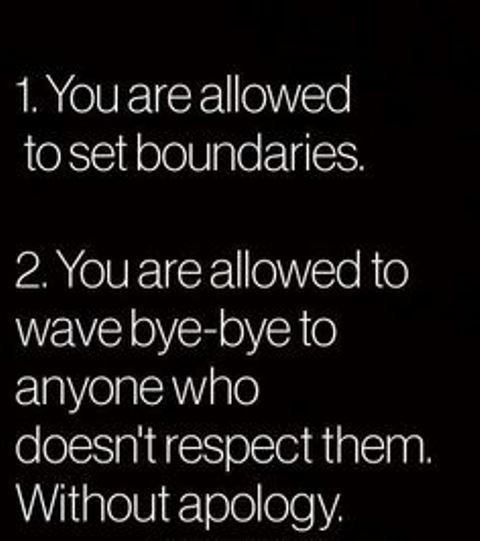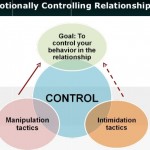Good fences make good neighbors. – Robert Frost
How far is too far?? That question has come to me in so many different forms, so many times that it was difficult to resist writing on it. From teenagers struggling in addictive relationships to young adults vacillating between the ends of a passive relationship and a self-absorptive one to adults refusing to see the violent patterns ingrained in their bond, countless people are stuck in relationships that are increasingly blurring the lines, even obliterating any boundaries between where one partner ends and the other starts.
Image source: Google, copyright-free image under Creative Commons License
No matter how much love exists between two people, it is unhealthy and even dangerous to our growth as individuals and even more so for the relationship we have given ourselves to.
The giving of ourselves in a relationship inevitably comes at a cost. Want to know what that cost is?
A price tag we label ourselves with.
Yes, you read that right. We all come with a price tag. Don’t get me wrong – this is more often than not an emotional price tag, but a value nonetheless. We value ourselves with a price that we believe we deserve for investing our feelings, time, energy, commitment, emotions or even our bodies. The sobering part of all of this is that we shall actually be ‘bought’ at the value that we have placed on ourselves.
My only contention here is to allow for a price that is not easy to purchase. For anything that is easily bought can be replaced with equal ease. In settling in a boundary-less relationship or a relationship with ill-defined boundaries, we not only let our price down and open our hearts, minds, and spirit to be wounded, broken, and bruised at the hands of someone who doesn’t even realize the excessive ‘value’ he/she is receiving at a discount. We are all worthy and deserving of so, so much more!!!!
Image source: Google, copyright-free image under Creative Commons License
If you have ever felt that you aren’t getting your due in a relationship, felt violated at being used for sex but not been a recipient of equally enthusiastic emotional intimacy, entered relationships too fast and too deep without knowing anything about the long haul, been with a raging alcoholic/drug addict, have been unable to sever ties with a perpetual cheater – you know exactly what I am getting at.
Suggested read: What are the signs of a healthy relationship?
Setting boundaries in relationships is crucial to building, nurturing, and sustaining a healthy and happy relationship. I have always maintained that an awareness of self is crucial to our interpersonal relationships. And therefore, having an accurate sense of self-worth helps one differentiate the absolutely essential need for individuation from the undeniably toxic trap of losing oneself in a relationship, that shall sooner or later turn dysfunctional owing to the conspicuous absence of clearly etched boundaries. Healthy boundaries are an imperative of maturity and self-actualization. As such, they aren’t rigid and can be flexible, depending on time and situation. However, a complete absence of boundaries engulfs independence and doesn’t make room for a healthy interdependence either. Therefore, it is not only important but compulsory to set boundaries that shall help you retain your sense of self even when you give yourself to your relationship. Here is what you need to do to set boundaries in relationships that cause you to feel drained, guilty, overwhelmed, inconsequential, confused, empty or worse, broken and dead:
- Recognize and take charge of your feelings: Acknowledge and accept what is it that is making you feel disillusioned, drained, bad, hurt/upset, angry, defensive, broken or empty. Being able to do is absolutely crucial to initiate that first step of differentiation of your identity as being separate from the other half that forms the relationship. Your togetherness in the relationship is not a function of union. It is an additive bond formed by two individuals, distinct, and unique in their own right. As such, this step is vital to set in motion an individuation process that shall allow for you to retain your independence for a healthy interdependence in the relationship.
Image source: Shutterstock
- Recognize how your ‘idea’ of boundaries has been crossed: Now that you know how you feel, you have to recognize which boundary that you have failed to state, and as a result, reinforce, has been crossed and how. Has he been asking for money all the time? Has she failed to close the doors on other guys? Are you losing sleep over his raging alcoholism? Are you always worried that she might step out on you? Recognize what is wrong and plan your next step.
- Recognize what boundary you need and how you can set it: Now that you need which boundary needs to be set in place, opt to discover a point of action for bringing it alive.
- Take charge of the execution process: This may entail communicating your need for the specific boundary to your partner. Usually, this results in a backlash from the other person or a guilt trip. Remember that neither of these are reasons to let go of your decision to instate a boundary you feel an acute need for. Your feelings are valid and you need to take care of them.
Image source: Google, copyright-free image under Creative Commons License
- Speak out, share: In asking for acknowledgement and reciprocal action to set up a boundary, you are making the effort needed to sustain a relationship you ‘chose.’ However, that does not mean that you are seeking validation of your feelings. If the communication process is met with a defensive/angry reaction or worse, denial, it might be your cue to walk away and take care of yourself.
- Take care of yourself, first: Coz this is what we must all do, before all else.
Suggested read: Are there telltale signs to identify an unhealthy relationship?
Here are a few types of toxic relationships I shall help you identify and set boundaries for, over the course of the ‘How Far Is Too Far’ series:
1. Abusive
Image source: Shutterstock
Sexual, emotional, physical, and verbal abuse are all red flags. Using sex, emotional attachment, touch or words to exert power or gain control over a person is absolutely devilish. Add to it, covert manipulation and you have got a perfect deal-breaker package. Don’t make excuses for this one, get out!
Suggested read: You can recognize an abusive relationship with these early warning signs
2. Addiction-ridden
Image source: Pixabay, under Creative Commons License
The only things that pop to mind when one talks of addiction are alcohol and drugs. But the spectrum of addiction consists of so much more – sexual struggles, financial irresponsibility, emotional scars, dependency and more. I am not saying that these are elements that make someone unworthy of love; all I am hinting at is that these struggles have to be addressed and dealt with accordingly. Healthy people make healthy relationships, and therefore, weeding out the ailment (addiction) is mandatory.
3. Codependent
These types of relationships have a partner deriving their sense of worth/esteem from the other partner. Need can be highly dysfunctional and should not be mistaken for passion or any such correlate of love. The most healthy relationships are ones where you retain your own self whilst being able to enjoy togetherness.
4. Deceitful
Image source: Google, copyright-free image under Creative Commons License
And this is not only about infidelity or cheating. If your relationship is one where you find yourself being constantly lied to or questioning the veracity of facts stated to you, you are in some serious trouble. If your relationship is not founded on truth, you can be assured that the hide-and-seek game isn’t going to be fun for the ‘rest of your lives.’
5. Avoidant
Anyone that cowers from confrontation or any conflict is a victim of avoidant behavior. Not only is this kind of behavior a deterrent to the process of establishing boundaries itself, this one shall never allow for the communication to take place too. We should all remember that a willingness to address issues in a relationship is key to dealing with them effectively.
Suggested read: How to retain your identity in a relationship
6. Passive
In giving up the driver’s seat to someone else whilst relaxing in the passenger seat for your own life, you are not only putting up your ‘lack of initiative, direction, and drive’ in life up on exhibit, but also making someone in charge of directing the course of your life. Usually an offshoot of insecurity, this one more often than not results in feelings of isolation and aloofness.
7. Controlling
Image source: Shutterstock
The factor missing in these relationships is trust. A healthy relationship built on trust naturally exudes freedom. However, a controlling relationship lacks the component of freedom and results in feelings of entrapment and stifles the victim as well as the relationship.
Remember, it is not without perceptive discernment that you should arrive at the price tag you adjudge you are worthy of. Remember that you shall stop handing out discounts to people, when you realize how much you are really worth.
Featured image source: Google, copyright-free image under Creative Commons License



















